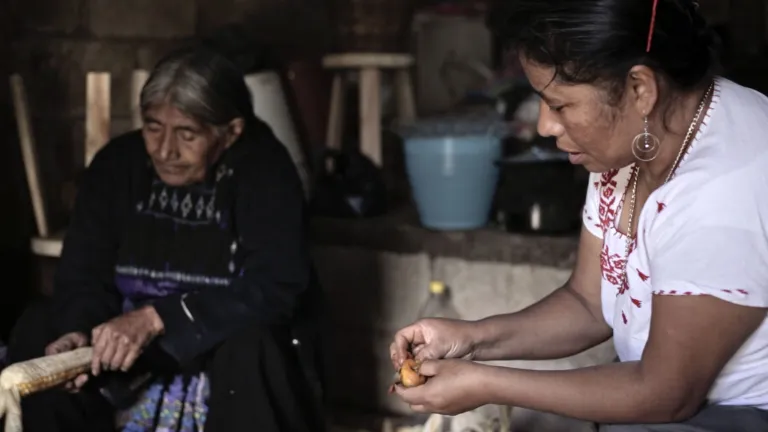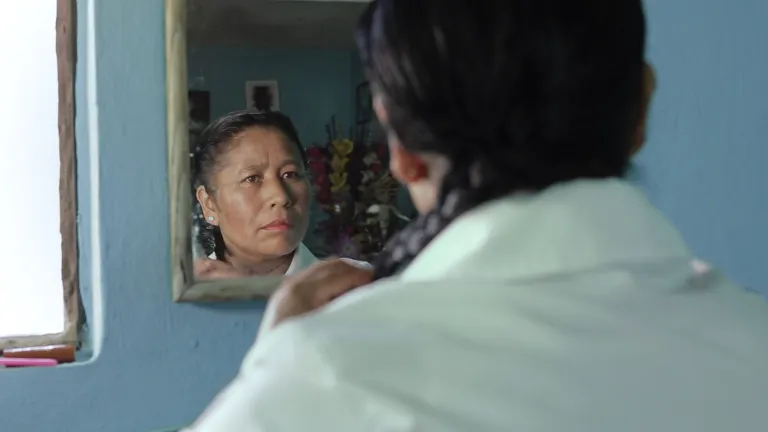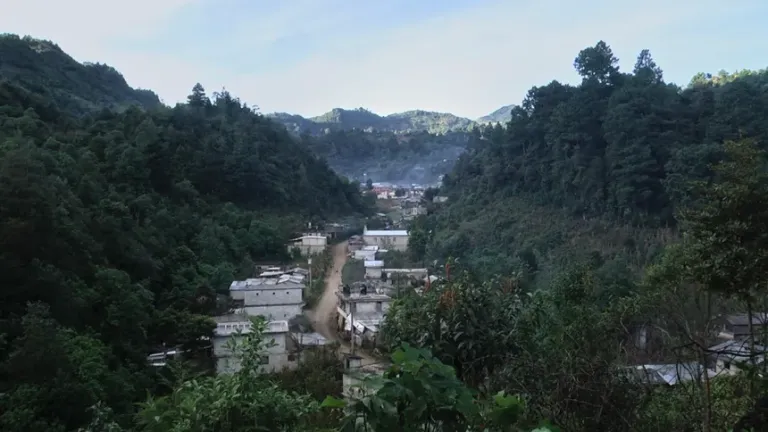Tucked away in the mountains of Chiapas lives a remarkable woman named Hilda. With care and resilience, she raised two boys on her own in a small Tzotzil community. Years later, her son Xun returns with his camera, seeking a deeper understanding of the struggles she faced and the strength she possesses.
Xun’s new documentary Mamá shines a light on Hilda’s little-told story. Through intimate conversations between mother and son, we learn of the hardships she endured from a young age. Promised in marriage at only nine, she rebelled as a teen and gave birth out of wedlock, facing deep stigma. Limited opportunities left indigenous women vulnerable.
Yet despite the hardships, Hilda has built a life of dignity through perseverance. She worked to support her family however possible. While traditional gender roles confined many to the home, Hilda now advocates for women’s health in her rural areas. Her journey shows that even the most disadvantaged people can overcome obstacles through community support and finding their own path.
Mamá serves as a vehicle for healing between Xun and Hilda too. It allows them to process difficult memories and gain new understanding. Most powerfully, Hilda’s voice is elevated, countering the silencing of so many indigenous women’s experiences. In opening her heart, she inspires others with her resilience and helps ensure abuse survivors know they are not alone. This profound, intimate film is a potent reminder of the challenges many face and the quiet ways people transform their worlds.
Weaving a Lifetime of Stories
Mamá takes a unique approach—it’s essentially an intimate interview between a filmmaker and his mother. Xun sits down with Hilda to learn more about her experiences growing up in rural Mexico. Through casual conversations, we hear tales that give profound insight.
Hilda opens up about the hard times she faced from a young age. Promised in marriage at only nine years old, she rebelled and faced deep stigma as a teen mother. Opportunities for indigenous women were slim. As she shares these difficult parts of her past, Xun listens with new understanding.
He realizes how much he misunderstood as a child. Constantly teased for not having a father, young Xun directed bitterness toward his mom. But in their talks, he gains perspective on what life was really like for her—raising kids alone, facing abuse, and societal expectations that hampered women.
Xun also reflects on reevaluating his views. As an adult making this film, he acknowledges unfairly blaming Hilda in the past. Through their dialogue, he sees her not just as “mom” but as a whole person who persevered against great challenges. We watch their relationship deepen.
By weaving together Hilda’s recollections and Xun working through his own feelings, Mamá creates an intimate tapestry. It brings to light harsh realities that Indigenous women traditionally faced but also celebrates one woman’s resilience. Most powerfully, a mother and son find new understanding through honest conversation.
Threading Through Tradition
Xun Sero brings an intimate visual style to Mamá, threading carefully through community and culture. His camerawork feels almost accidental, quietly observing Hilda’s daily rituals. Whether she’s cooking in the kitchen or driving around town, it’s as if we’ve stumbled upon moments not meant for outsiders.
By lingering in this way, we see beyond surface interactions to deeper traditions—the rhythms of rural life and family roles that still shape Hilda’s world. Without forcing attention, the cinematography honors these roots. Nature sounds like crackling fires become the rich backdrop, replacing formulaic movie music.
Yet Sero doesn’t shy away from harder truths. When we don’t see men, their power still looms largely. One scene cuts sharply from open female talks to their silencing presence. Through absence, the imbalance surfaces clearly, felt rather than forced upon us.
With care, not judgment, Sero threads between upholding cultural identity and addressing harsh realities Indigenous women face. His documentary lets beauty in tradition speak for itself, even as past scars receive their due. Through intimated, thoughtful images, Mamá excavates enduring spirit from hard history’s soil.
Gender & Growth in a Living Tradition
Mamá addresses tough topics but does so by focusing on lived realities. Xun Sero presents his community’s history frankly yet respectfully. And through his mother Hilda’s story, we see how the past still shapes their present while change slowly emerges.
Hilda recalls her youth facing violence simply for being female. And even as a girl, she knew no options but early marriage. These difficult truths bring the patriarchal system’s harsher face into light. But Sero treats such issues fairly, not to condemn but to understand his culture’s deeper roots.
By mixing Hilda’s recollections with images of indigenous women’s modern work, the film connects eras visually. Though many ladies still scrape by on streets as their grandmothers did, progress glimmers in Hilda’s career advocating for women. She speaks for others facing the same struggles she overcame.
Sero paints his mother as a figure of quiet revolution. While traditionally tethered to home, Hilda drives her own car and informs healthcare policy. Yet the film presents this evolution organically rather than confrontationally. We see change grow from within as Hilda passes down strength and self-reliance to new generations.
Rather than resignation, Mamá conveys hope that traditions equipped Hilda and others to change society gradually from the ground up. By upholding their community’s dignity even as injustices appear, the film honors a living culture that bends toward justice through the resilience of women like Hilda. Her rising voice suggests a future when all may live freely within their proud heritage.
Reconnecting Through Raw Revelations
Xun Sero’s interactions with his mother offer a window into their evolving bond. From contempt in youth to newfound caring as adults, their onscreen dynamic shows relationships grow through open dialogue.
Hilda proves a willing conversant, candidly recounting hardships with humor but no disguising harsh truths. Far from bitterness, she displays resilience, empowering others. Sero listens intently, reflecting how forming judgments as a child differed from understanding another’s full story.
Sero once directed anger wrongly towards his mother, rueing lost time with his father. Now he recognizes outside burdens Hilda bore with grace. Though machismo haunts their community, between them seeds of change take root. Respect replaces resentment as Sero approaches his interviewee not as a subject but as equal.
Their interaction acquires a therapeutic quality, exorcising past misconceptions. Where Sero was estranged, this film mends resentments and brings them closer. Stripped instances portray their bond’s sincerity, from teasing in the kitchen to sharing meals with ease. Sero seems consoled piecing his family’s narrative, while Hilda’s dignity shining through reaffirms a son’s admiration.
By baring intimate truths to cameras and each other, this pair finds connection; their courageous revelations foster understanding. Their story shows closed doors in relationships, and minds do not remain so if we lend empathy to walk in another’s shoes.
Facing the Past, Empowering the Future
Mamá takes audiences on a profound journey, confronting issues still hindering progress yet also fostering hope. Chief among its impactful themes are the lasting effects of machismo and the quiet resilience displayed every day by women like Hilda.
For Sero, revisiting the past through honest dialogue meant addressing misconceptions formed in youth. Facing hard truths about his mother’s experiences and seeing her strength up close, he gained newfound empathy and respect. Their bond was strengthened by peeling back layers of discomfort to reach deeper understanding.
While the director’s community still struggles under patriarchal rule imposing silence on women’s lives, this film revokes that silence. Hilda’s story shatters stigma, instead gaining support. Her work empowering others represents small steps toward the equality long denied Indigenous women.
Mamá leaves audiences with a powerful message: by facing our prejudices and lending our voice to the voiceless, we can heal damaged relationships and work to establish a kinder future. Though change happens gradually, stories like these that foster compassion will help ensure fewer women endure suffering like Hilda’s in the generations to come. Through the film’s example of openness overcoming conflict, viewers take hope that continued dialogue can ease societies toward greater justice and wellbeing for all.
The Review
Mom
Mamá tells an intimate yet profoundly universal story about empowerment through empathy and understanding. Director Xun Sero has crafted a moving portrait of resilience that confronts injustice while also healing wounded relationships. By facing hard truths with courage and compassion, this film proves how sharing our experiences can help alleviate suffering and create positive change.
PROS
- Powerful storytelling that addresses important issues
- Authentic and insightful dialogue between director and mother
- Promotes understanding of women's issues in their community
- Strengthens bond between filmmaker and mother through honest reflection
CONS
- Some scenes could make viewers uncomfortable.
- Culture and traditions portrayed may be unfamiliar to some audiences.
- Subtitles needed for non-Spanish speakers





















































Discussion about this post